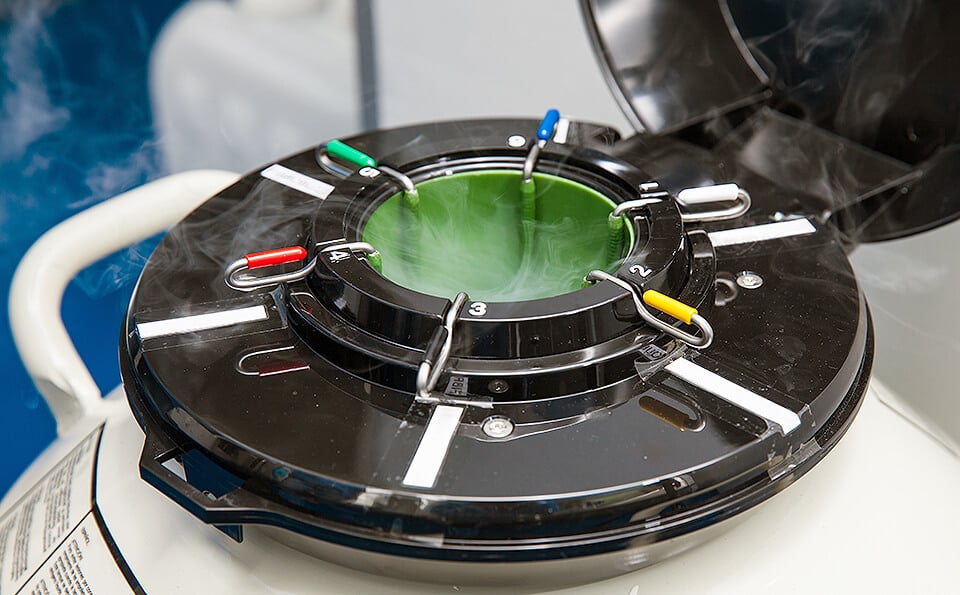
Life Span of Frozen Sperm -- Ask The Experts
Question: I am an educator for a human sexuality class. A student asked me an interesting question that I was unsure how to answer. Given that we know sperm can survive about 72 hours in a woman's body, how is it possible to keep sperm viable by freezing them?
Answer: Sperm can survive for a long time under the right circumstances. In a woman's body we think that 72 hours is approximately correct, but the data supporting this estimate is not conclusive. In the lab, sperm can live 5 days or more provided they are removed from the seminal fluid and placed in a more nurturing environment. Seminal fluid contains many enzymes that first clot and then liquefy. This change in the fluid allows the ejaculated sperm to stay in the vagina initially, but then swim out as the seminal fluid becomes more liquid. These enzymes quickly destroy any sperm that can't swim out of the semen within a few hours.
It takes approximately 72 days for sperm to mature in the body. During the last 14 days of this process, the sperm are very much alive and swimming. They are alive a long time prior to leaving a man's body.
During freezing, sperm are cooled to a very low sub zero temperature (minus 196 degrees Centigrade). At that temperature, all biological activity is effectively stopped. The sperm cells are not metabolizing or depleting their energy reserves. They are truly in suspended animation. Bacteria or other microbes cannot attack or degrade the sperm in any way because they are also unable to function at such a low temperature. Everything is on hold.
Biologists believe that correctly frozen cells in long term storage can literally last forever, as long as the temperature is properly maintained. It is believed that constant exposure to normal levels of background radiation is the only thing that could cause loss of viability and this effect is difficult to measure. Studies done in the 1970's, exposing frozen mouse embryos to the equivalent of 2,000 years of background radiation, showed no measurable mutagenic effects in offspring.
Cryobiology is a relatively new science, and human fertility treatments are newer still. Consequently, in humans there are no long term results with frozen sperm or embryos. There are a handful of reports showing babies born from embryos that had been frozen for 12-15 years. A couple in New York had a child in 2005 from sperm that had been stored for 28 years. Sperm frozen for domestic animal species have a longer record because samples frozen in the 1950's are still viable.
The process used for freezing is very precise and works best when cells exist individually (such as sperm) or in very small groups (such as an embryo). Larger masses of cells, tissues or even whole bodies cannot be frozen and subsequently thawed alive. It is not currently possible to freeze and thaw a whole ovary or kidney.
To successfully freeze cells we must remove cell water (water expansion during freezing would burst the cell) and replace the water inside the cell with antifreeze. This is done by incubating the cells in a solution of antifreeze. The water and antifreeze swap places through the process of simple osmosis. In a complex tissue like an ovary, there is no way to get all the water out of all of the cells so easily, thus a whole ovary cannot be frozen. If the ovary is chopped up into tiny pieces however, more water can be extracted. Some success has been reported with freezing ovarian pieces in this way.

The following student experiment demonstrates the challenges of freezing. Place a whole peach into your freezer for 24 hours and then thaw it out and see what a mess you have. If however you slice the peach up and mix the slices with sugar for 15 minutes (the sugar will draw out water from the cells), you can freeze the peach quite successfully. If the technology is used correctly, you can keep your peach (or your sperm) for leaner times.
— Joe Conaghan, PhD, HCLD
Categories
About the Blog
Welcome to the Pacific Fertility Center Blog! Nationally and internationally recognized for providing exceptional reproductive care, our team believes in empowering people with the knowledge they need to navigate their unique fertility journeys.
From information on the latest fertility treatments to valuable insights on egg donation, surrogacy, and everything in between, the Pacific Fertility Center Blog is your ultimate resource for all things reproductive care and support. Read on to learn more, and contact us today if you have any questions or want to schedule a new patient appointment.

